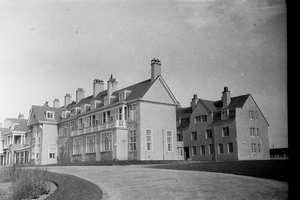[Received April 9, 1918]
#38
March 20, 1918
Turnberry, Scotland
Dear Mother and Father:
I have a lot of back dope to tell you all about, but I guess I had better get the modern dope off my chest.
They shipped us out of London Colney Monday afternoon. Tommy Herbert, Frank Read, and myself were all posted here together. We were allowed Monday afternoon and evening in London, and took the train at 8.50 Tuesday morning for here. We arrived at 9.30 p.m.
I called on Helen’s friend Ann Greville in the afternoon. She surely is lovely. My stock in Great Britain went zooming skyward after meeting her. I met her mother, father, and younger sister. They are full blood Welsh. The girls are exceptionally beautiful, very bright, interesting and musical. She is engaged to a Canadian doctor. I hurried from Grevilles to Frank Williams, and chatted with him for about ½ hour before I ran for my train to Whitings. I took dinner with them and spent the evening and night. They were very much thrilled and interested in my poor attempt to do some stunts over their garden in a Spad. They got me away with an early breakfast in time to get to London at 8 A.M. Ralph went in to St. Pancras with me.
We had a pretty tiresome trip up here. It was a foggy day so we could not see much country. There was a diner car on and we made a good use of it by getting lunch, tea, and dinner.
This is very luxurious living for war times. Turnberry is a famous golf course, right on the coast. It was developed by the railroad. We all live in the large swell hotel. We have beds, sheets, fine bath rooms, hot water etc. Herb, Frank, myself, and an R.F.C. chap are in one room. Our window looks right out over the Firth of Clyde and Irish Sea. There is a big army of WAACs here waiting on table and fixing up our rooms. The meals so far have been wonderful. The sea air is so bracing that I feel like eating all the time. Have a nice letter from Knud.
Goodnight for now,
Lovingly,
Parr

Annie Maria Greville was the same age as Parr; her sister, Gwenyd Sarah, was about eight years younger. Her parents were both born in Wales; her father was a schoolmaster, and Annie is listed in the 1911 census as an assistant art teacher.316 Her fiancé was the Toronto born physician George William Anderson, who had joined the Canadian Expeditionary Force in 1914.317
The Women’s Auxiliary Army Corps (WAAC) was established in England in early 1917. Its members took on jobs that would otherwise have been done by men needed to fight.
The War Birds diary entry for this day, from Ayr, a little farther north up the west coast of Scotland, reports that Thomas Cushman Nathan (see Parr’s letter of January 14, 1918) was killed when “he was flying an S.E. and the wings came off at five thousand feet.”